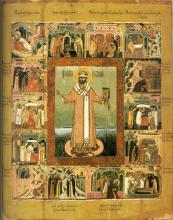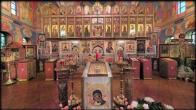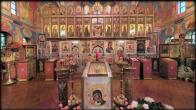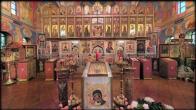You are here
Hieromartyr Philip, metropolitan of Moscow and All Russia
9/22 January
 St Philip (born Theodore) was a descendant of the noble Kolichev boyars. Theodore was the first-born son of the boyar Stepan Ivanovitch and his God-fearing wife Barbara. His hagiographer wrote that from an early age, Theodore with heartfelt love was attached to divinely-inspired books. He was noted for being staid and meek, and he avoided amusements. Because of his noble extraction, Theodore was often in the royal palace. His meekness and piety left a strong impression on the mind of Tsar Ivan, who was the same age as he.
St Philip (born Theodore) was a descendant of the noble Kolichev boyars. Theodore was the first-born son of the boyar Stepan Ivanovitch and his God-fearing wife Barbara. His hagiographer wrote that from an early age, Theodore with heartfelt love was attached to divinely-inspired books. He was noted for being staid and meek, and he avoided amusements. Because of his noble extraction, Theodore was often in the royal palace. His meekness and piety left a strong impression on the mind of Tsar Ivan, who was the same age as he.
Following his father’s example Theodore entered military service, and would have enjoyed a bright future; however his heart was not inclined toward the riches of the world. In contrast to the common practice, he did not marry until the age of 30. While in church one Sunday, he was greatly affected by following words of the Savior: “No man can serve two masters: for either he will hate the one, and love the other; or else he will hold to the one and despise the other” (Matthew 6: 24). Hearing in those words his monastic calling, he put on peasant attire, secretly left Moscow, and went to the Solovetsky Monastery. There, over the course of 9 years, he humbly lived the difficult life of a novice, working as a simple peasant, at various times in the garden, in the blacksmith’s shop, and in the bakery. Finally, by consensus of the brethren, he was ordained a priest and appointed abbot.
In this rank, he zealously cared for the monastery’s welfare in both the material, and (more importantly) the moral sense. He had canals dug to connect the ponds, and drained the swampy areas so that they might be planted with hay, put roads through previously impassable places, began to raise cattle, renovated the pickling plant, built two great cathedrals (the Dormition and the Transfiguration Cathedrals), as well as other churches. He also built a hospital, and founded scetes and hermitages for those wanting [to live in] silence; at times he himself would escape to a deserted place known in pre-revolutionary times as “Philip’s Hermitage.” For the brotherhood, he composed a new ustav, which described a hard-working life, forbidding idleness.
Abbot Philip was summoned for spiritual counsel to Moscow, where during his first meeting with the Tsar, he learned that he was appointed Metropolitan [of Moscow]. He tearfully begged Ivan: “Do not separate me from my Hermitage; do not entrust to a little boat the burdens of a large one.” Unmoved, Ivan instructed the bishops and boyars to convince Philip to accept the rank of Metropolitan. Philip agreed, but demanded the disbanding of the Oprichnina. The bishops and boyars convinced Philip that, out of respect for the Tsar’s autocratic authority, he should not urgently press that demand, but instead should humbly accept the rank. Philip deferred to the will of the Tsar, seeing in it God’s Will.
During the initial years of Philip’s hierarchical service (1567-68) the terrors of the Oprichnina subsided, but not for long. Soon, looting and murder of peaceful citizens resumed. In several private conversations, Philip tried to enlighten the Tsar, but seeing that his arguments were not helping, decided to take action openly.
Before the beginning of the Liturgy for the Sunday of the Cross, March 21st, 1568, the Metropolitan was standing on the cathedra in the middle of the church. Suddenly Tsar Ivan, accompanied by a group of oprichniki, entered the church. They all wore tall black hats and black riassas, from within which shone knives and daggers. Ivan approached the Metropolitan from the side and three times bowed his head to receive his blessing. The Metropolitan stood still, his gaze directed at the icon of the Savior... Finally the boyars said: “Holy Master, the Tsar demands your blessing!” The Hierarch turned to Ivan, as if not recognizing him, and said: “In this strange apparel I do not recognize an Orthodox tsar; nor do I recognize him in matters of the realm. O pious one! Whose example do you follow, to so deform your magnificence in this way? At no time since the sun has shone upon the earth has it been heard that pious Tsars should incite their own kingdom to rebel… The Tartars and pagans have law and truth - but we have it not! We, my lord, offer the bloodless sacrifice up to God, while beyond the altar the innocent blood of Christians is being spilled. I do not sorrow for those, who by the spilling of their innocent blood are made worthy to join the Holy Martyrs; I grieve for your poor soul. Although graced with the Image of God, you are nonetheless an ordinary mortal, and the Lord will exact all from your hands.”
Ivan was seething with rage. He whispered threats, and banged his staff upon the stone of the cathedra. Finally he exclaimed: “Philip! Do you dare to oppose our authority? We will see if your strength be great!” “O Good Tsar,” the hierarch answered, “in vain do you try to frighten me. I am but a stranger on this earth, struggling for the truth, and no manner of suffering will silence me.” Terribly irritated, Ivan left the church, but hid his anger only for a time.
On July 28th, the Feastday of the Smolensk Icon of the Mother of God, known as Odigitria [indicator of the path], St. Philip was serving in the Novodevichy Convent, and conducting the procession around the Convent. The Tsar, surrounded by oprichniki was also present. During the reading of the Gospel, the hierarch noticed that an oprichnik standing behind the Tsar was wearing a Tatar headdress, and pointed him out to Ivan. But the oprichnik managed to take off the hat and hide it. The oprichniki accused the Metropolitan of lying in order to humiliate the Tsar before the people. Ivan then ordered that Philip be judged. Several slanderers were found to make false accusations against the Metropolitan. The Metropolitan was not given the right to expose them as liars, and was condemned to lose his cathedra.
On November 8, the Feast of the Archangel Michael, the Holy Hierarch was serving for the last time in the Cathedral of the Dormition. He was standing on the cathedra, just as he had been when he denounced Tsar Ivan the Terrible. Suddenly the doors of the church opened and the boyar Basmanov entered with a host of oprichniki and ordered the reading of a document in which it was announced to the surprised faithful that the Metropolitan was being defrocked. The oprichniki immediately ripped the hierarch’s vestments from him. Clothing him in a torn monastic riassa, they led him out of the church. They sat him in a cart and, shouting expletives at him drove him to one of the Moscow monasteries. It was rumored that the Tsar wanted to burn the Confessor for Christ, and that only after intercession by the clergy was Philip condemned to incarceration for life. At the same time, the tsar executed many of Philip’s relatives. The Terrible one sent the Holy Hierarch the head of Ivan Borisovitch Kolichev, Philip’s most beloved nephew. Holy hierarch Philip received it reverently; after making a prostration before it, he kissed it and said: “Blessed is he whom Thou hast chosen and accepted, O Lord,” and returned it to the sender. From morning to night the faithful gathered around the monastery, wanting to at least catch a glimpse of the glorious hierarch’s shadow, and told many stories of his miracles. Then Ivan ordered that he be transferred to the Monastery of the Child in Tver.
A year later, the Tsar and his warriors went into battle against Novgorod and Pskov. The Tsar sent the oprichnik Maliuta Skuratov ahead of him to the Monastery of the Child. Three days earlier, St Philip had prophesied his own coming repose and had prepared for it by Communing of the Holy Gifts. With a false air of humility, Maliuta approached the Hierarch and asked a blessing for the Tsar. St Philip said: “Do not blaspheme, and do the deed for which you came.” Maliuta threw himself at the hierarch and strangled him to death. A grave was immediately dug and Maliuta witnessed the Hieromartyr being lowered into it on December 23, 1569. The relics of St Philip lay in the Moscow Cathedral of the Dormition, which had witnessed his enormous spiritual struggle.
PARISH LIFE
RECENT VIDEOS
Address of our Cathedral
Subscribe to our mailing list
While all the materials on this site are copyrighted, you may use them freely as long as you treat them
with respect and provide attribution on the Russian Orthodox Cathedral of St.John the Baptist of Washington DC.









